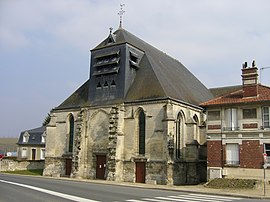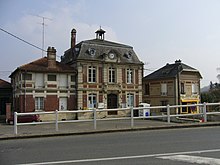Guny
Guny | |
|---|---|
 The church of Guny | |
| Coordinates: 49°31′11″N 3°16′06″E / 49.5197°N 3.2683°E | |
| Country | France |
| Region | Hauts-de-France |
| Department | Aisne |
| Arrondissement | Laon |
| Canton | Vic-sur-Aisne |
| Government | |
| • Mayor (2020–2026) | Jean-Marc Baillon[1] |
Area 1 | 9.32 km2 (3.60 sq mi) |
| Population (2022)[2] | 363 |
| • Density | 39/km2 (100/sq mi) |
| Time zone | UTC+01:00 (CET) |
| • Summer (DST) | UTC+02:00 (CEST) |
| INSEE/Postal code | 02363 /02300 |
| Elevation | 42–152 m (138–499 ft) (avg. 70 m or 230 ft) |
| 1 French Land Register data, which excludes lakes, ponds, glaciers > 1 km2 (0.386 sq mi or 247 acres) and river estuaries. | |
Guny (French pronunciation: [ɡyni]) is a commune in the Aisne department in Hauts-de-France in northern France.
History
In 858, Guny's village is given to the abbey of Notre-Dame of Soissons by Charles the Bold.
In 1368, Enguerrand VII of Coucy grants the collectivity franchise to Guny and twenty-two other churches.
1914–1918, World War I devastated the village. From August 27 until September 28, the 11th and 20th infantry fight Battle of Ailette around Guny's quarries.
Saint Georges' church is destroyed. It was restored in 1923.
A new bell was inaugurated in November 1923, in a temporary church.
Geography
The river Ailette forms all of the commune's northeastern border.
Population
| Year | Pop. | ±% |
|---|---|---|
| 1962 | 580 | — |
| 1968 | 562 | −3.1% |
| 1975 | 594 | +5.7% |
| 1982 | 549 | −7.6% |
| 1990 | 508 | −7.5% |
| 1999 | 447 | −12.0% |
| 2008 | 437 | −2.2% |

See also
References
- ^ "Répertoire national des élus: les maires" (in French). data.gouv.fr, Plateforme ouverte des données publiques françaises. 13 September 2022.
- ^ "Populations de référence 2022" (in French). The National Institute of Statistics and Economic Studies. 19 December 2024.



